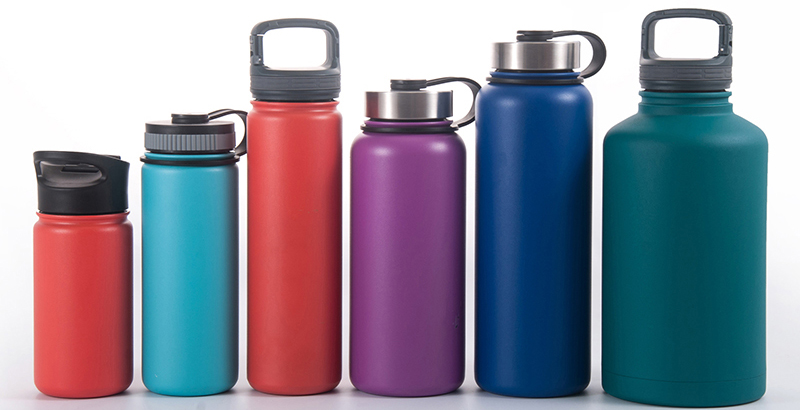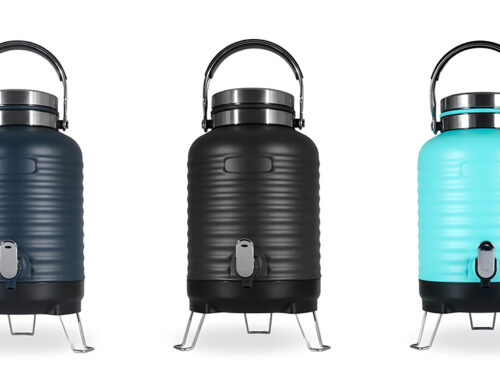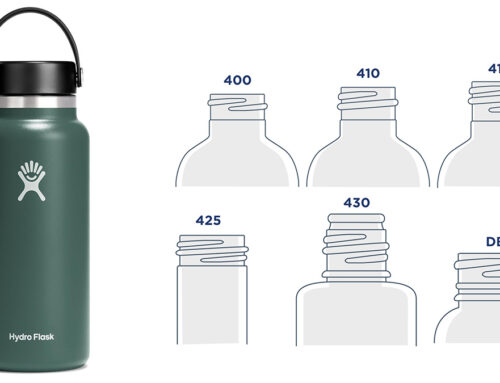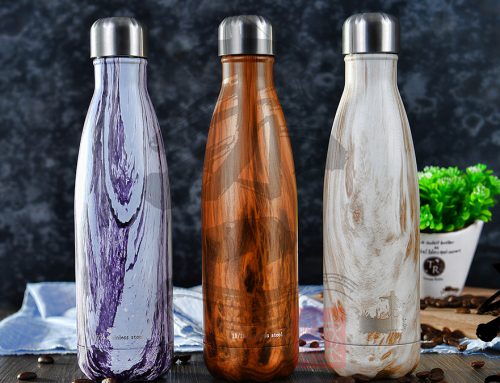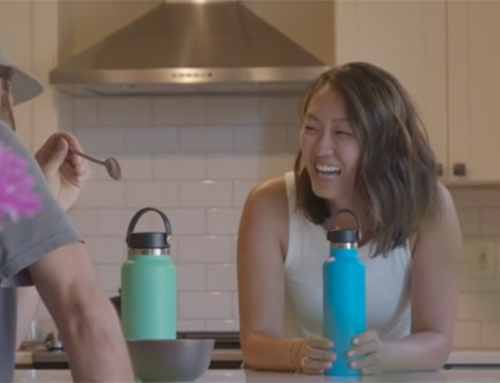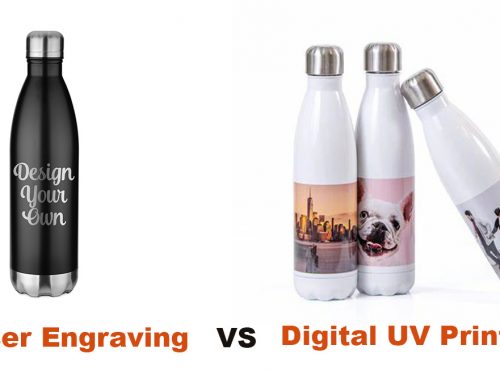As more and more research on the shortcomings of bottled water were reported on newspaper and internet, reusable water bottles are popular in the early 21st century. Reusable water bottles save money and are more environmentally friendly than discarding bottles after one use.
There are good reasons to give up buying water from disposable plastic bottles.
Bottled water is no safer than tap water. According to reports, tap water is actually more stringent than bottled water. In 2018, most bottled water comes from tap water (bottled water – purity illusion). With a good filter, your tap water may be much better than bottled water.
Drinking tap water is much cheaper than drinking bottled water. When you buy 35 bottles of water, it costs about $0.95 per gallon. The water cost of the faucet is about $0.002 per gallon. There is no doubt that tap water is better than the cheapest bottled water.
Fortunately, like many green foods, it is very easy to reduce the waste of plastic water bottles and reduce the cost of household water.
About 99 billion non-reusable plastic water bottles are not recycled every year. This means that most of the plastic bottles produced are ultimately in landfills or water systems. Therefore, it is worthwhile to find alternatives for the environment and wallet.
What is your choice? Let’s start using environmentally friendly reusable water bottles.
Reusable Water bottle Benefits:
- Reusable water bottle reduces waste
- Reusable water bottles are most cost effective
- Reusable water bottles last longer
- Reusable water bottles are safe for the environment if wisely chosen
Material
There are many options on the market for reusable water bottles. Typically, reusable water bottles are made of copolyester, polycarbonate, polyethylene, polypropylene, biodegradable bioplastics, stainless steel, aluminum, glass and ceramics. . There are a few glass manufacturers and retailers that can reuse water bottles. The most durable bottles are made of stainless steel and aluminum.
But we think the most important consideration is that water is safely stored in the bottle – no chemicals are leached from the container.
In the past few years, the main concern has been chemicals, BPA, which is a key ingredient in polycarbonate plastics and epoxies. Until a few years ago, many plastic food and water/beverage containers were made of plastic. These plastics all contain BPA. Bisphenol A (BPA) is a component that is often found in plastic products. Estrogen that can impede chemical modeling and brain and reproductive development that can harm the fetus, infant, and child.
The US Food and Drug Administration says exposure to low levels of bisphenol A (BPA) is safe, but because we are constantly exposed to BPA (plastic toys, plastic food containers, canned foods, store receipts, etc.), we’d better reduce it anytime, anywhere. Exposed. Includes reusable water bottles. So many manufacturers of plastic food containers and water bottles to use BPA-free plastics like Tritan.
But “BPA-free” is not a reliable term for plastics. For example, many brands of reusable bottles (before August 2008) are labeled as “BPA-free,” but one study found (and then some brands confirmed) that the aluminum used in aluminum reusable water bottle liners The resin contains BPA. A recent study by the University of California shows that even “BPA Free” plastic products can pose a serious threat to human health, disrupting the reproductive system and affecting embryonic development.
When choosing a reusable water bottle as a potential favorite, we focus on what we know (as of now) water bottles made from the safest water storage materials. We mainly choose non-plastic reusable water containers made of food grade safety materials such as stainless steel, aluminum (BPA-free lining), ceramic and glass. Because aluminum is harmful to human health, in fact, aluminum cups have been eliminated by the market.
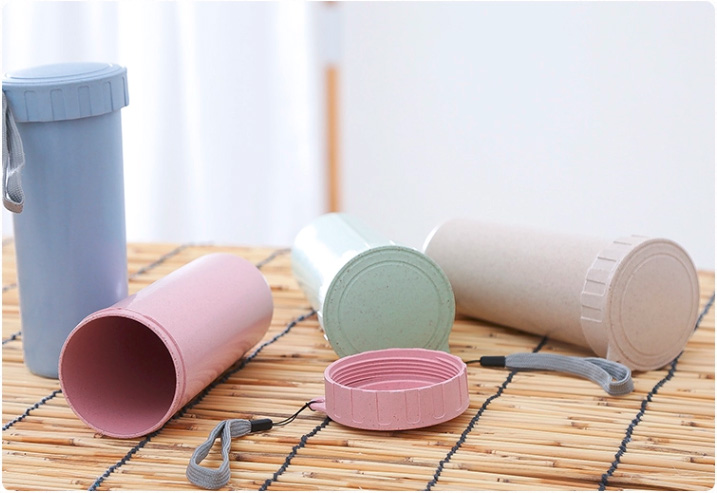
reusable biodegradable plastic (wheat stalk) water bottle
The following table is a comparison of the properties of various materials.
| Main Materials for Reusable ECO-Friendly Water Bottle | |||||||
| Material | BPA Free | Suitable for Hot Beverage | Suitable for Cold Beverage | Suitable for Outdoor or Sports | Durable | Remark | |
| Metal | Stainless Steel (grade 304) | Yes | Yes | Yes | Yes | Yes | Most Recommended |
| Aluminum | Yes | Yes | Yes | Yes | Yes | Aluminum is harmful for health | |
| Plastic | Tritan | Yes | No | Yes | Yes | Yes | Recommend if no hot drinks |
| PP | Yes | Yes | Yes | Yes | Yes | ||
| PETG | Yes | No | Yes | Yes | Yes | ||
| Biodegradable Plastic | Yes | No | Yes | Yes | Yes | ||
| Others | Glass | Yes | Yes | Yes | No | No | Recommend if no outdoor or sports using |
| Ceramics | Yes | Yes | Yes | No | No | Recommend if no outdoor or sports using | |
The Main Disadvantages of Plastic bottle
The disadvantage is that it cannot withstand high temperature, and it is easily decomposed and deformed due to excessive temperature. When the temperature reaches a certain value, some high-molecular polymers will be decomposed, resulting in a deformation of the water cup and sometimes an irritating taste.
Stainless Steel Water Bottle
Although there are some good plastic water bottles there, stainless steel water bottles are widely considered to be the most cost-effective green water bottles. Customized stainless steel water bottles will be used for life without health risks or risks to health. There are many different design options and sizes to choose from. These stainless steel water bottles are customizable and ideal for your home, travel, office, promotional donations or green fundraising events.
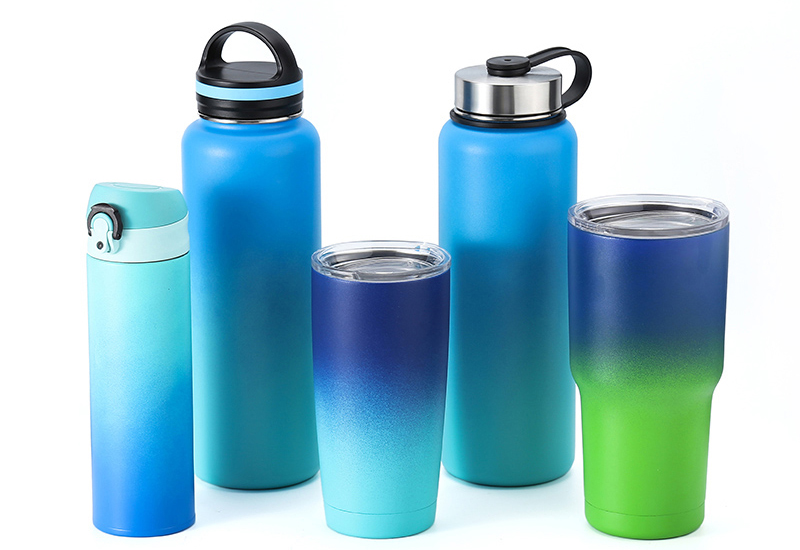
reusable vacuum insulated stainless steel travel mug and water bottle
Safety
BPA is similar to estrogen and can trigger the reaction of human hormones. It is an organic compound containing two phenolic functional groups and is a raw material and additive for some important polymers. BPA has many applications. It can be used in several polymers such as polyester, polysulfone, and polyether ketone. It can also be added as an antioxidant and a hardening inhibitor to plasticizers. It can also be used as a polymerization inhibitor. Add to PVC. BPA is also an important monomer for PC and epoxy resins. PC plastic is transparent and resistant to fall, and is widely used in many consumer products such as drinking glasses, baby cutlery, sports equipment, medical equipment, optical discs and household appliances. Epoxy resins are commonly used in the inner coating of some food and beverage cans.
BPA shows hormone-like properties that raise concerns about consumer products and the use of food containers. Governments in some countries have investigated their safety since 2008, prompting some retailers to withdraw from polycarbonate products. The US Food and Drug Administration (FDA) report in 2010 suggested that BPA may be harmful to the fetus, infants and children, but the report confirms that very low concentrations in certain foods are safe. In September 2010, Canada became the first country to declare BPA toxic substances. The EU, Canada, and the United States have banned BPA use in baby bottles.
BPA is toxic, and long-term inhalation of BPA powder is harmful to liver function and kidney function; especially serious, it reduces the amount of hemoglobin in the blood.
Garbage and Recycling
When you use reusable water bottles, you can help reduce the production of bottled beverages, thereby reducing the bottle’s landfill and recycling burden. According to statistics, in 2016, only 11.8% of plastic beverage bottles were recycled, and only 55.47 million tons of bottles sold were only 6.54 million tons. In addition, stainless steel reusable bottles can be recycled in your community if they are damaged after further use.
Cost
In 2018, unit price of most reusable water bottles is from USD5 to USD25. Comparing with buying bottled water, buying and using reusable water bottles with tap water can save long-term costs. In fact, according to reports, the cost per gallon of bottled water can be as much as 10,000 times that of tap water.
Clean
Reusable plastic water bottles can produce unpleasant taste or odor over time. This may be due to plastic leaching or the growth of mold or mold in the container. It has been reported that most of the odor and taste problems of outdoor equipment retailers are due to the fact that the bottles are stored in damp or not completely discharged between uses. Wash the plastic water bottle with a small amount of bleach and baking soda, antibacterial mouthwash or vinegar and mix with a whole bottle of water.
About how to clean stainless steel bottles, please go to another article: https://www.waterbottle.tech/tips-for-using-therms-cups/
Conclusion
In order to protect the earth and reduce pollution, we need to try not to use disposable cups, try to use reusable water bottles.
More about reusable water bottles: 316 and 304 Stainless Steel: ECO Friendly Water Bottle Material
KingStar is a leading reusable water bottle manufacturer. We focus on developing and manufacturing high quality vacuum insulated insulated stainless steel water bottles, flasks, tumblers, coffee mugs, coffee pots, coffee jugs, beer pints, growlers, food jars and other insulated containers that aim at keeping liquids hot or cold for long hours.

